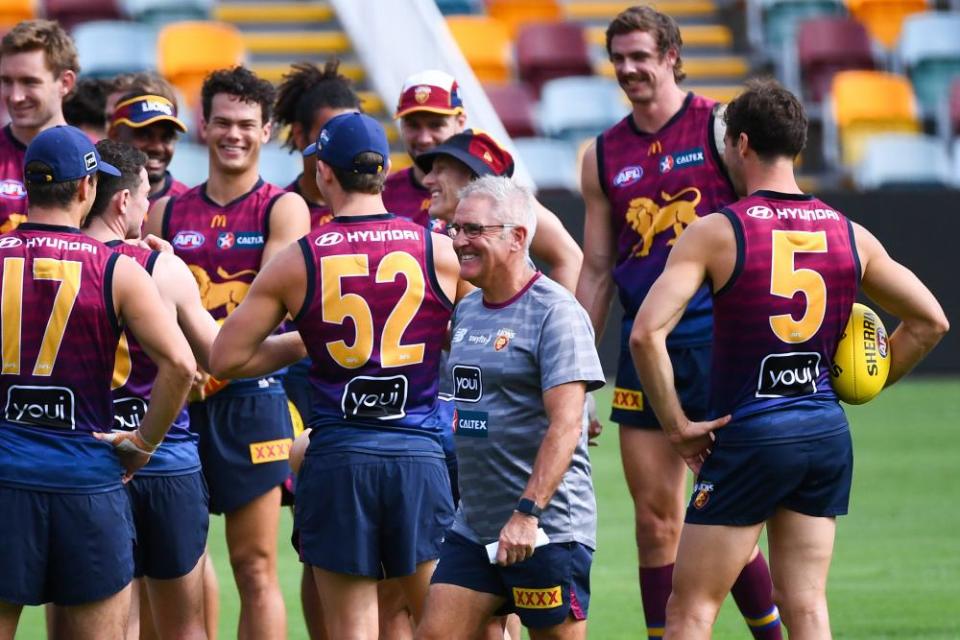Is Brisbane big enough for both codes? AFL’s Lions stare down challenge from NRL
The ‘Battle of Brisbane’ on Friday night has the NRL buzzing, but on the south side of the river in the Queensland capital, the Lions have a fight on two fronts to consider in the AFL. Brisbane’s clash against Melbourne at the Gabba, scheduled at the same time as the meeting between the unbeaten Broncos and Dolphins at Suncorp Stadium, serves as an early-season barometer.
After a disappointing 54-point loss to the Power in Adelaide last week, the clash with Melbourne is an important challenge for a side considered a premiership contender. It is relatively rare in the AFL for teams that drop their first two matches to play in the finals, though Brisbane is among recent exceptions, having done so in 2001.
Related: Brisbane gears up for battle for the city that not even the NRL could have scripted | Joe Hinchliffe
But the fixture clash with the NRL is also a test for the AFL, which has discussed with pride in the past month the foothold it is establishing in the northern state. At the season launch at the Malthouse theatre early in March, AFL chief executive Gillon McLachlan declared the code was on the verge of becoming the biggest in Queensland.
Stating the AFL’s goal for every house and school to have a football, McLachlan said “we know we need [to build] an oval a week, every week, to cater for that growth” of Australian rules football in the sunshine state. We are seeing [participation] numbers lifting above pre-Covid levels, particularly in Queensland where AFL, within a year or two, is on the brink of being the biggest code in the state,” McLachlan said. “[That is] something unthinkable a decade ago.”
McLachlan’s proclamation, delivered at a venue for thespians, may sound theatrical but the raw numbers show there is nothing ostentatious about the claim. There were more than 55,000 registered AFL participants at grass roots level in Queensland last year and the Lions set a record membership of 43,319. This more than doubles its tally of 2017, a year they claimed the wooden spoon, and demonstrates the importance of sustained success on the field in Queensland.
“The growth, to be honest, you would describe it as spectacular,” says Brisbane Lions chairman Andrew Wellington. “In terms of community participation rates, we’re on track, probably within the next 12 months, to become the third largest AFL state. So we’ll go past South Australia. We’ve got more participants than New South Wales, notwithstanding [the fact] they are a much larger population. It has been really significant.”
The AFL promised to leave a lasting legacy in Queensland after the state rescued the code in the Covid-19 riddled season of 2020. Tens of millions of dollars had already been delivered in establishing the Gold Coast Suns, but the AFL has honoured its investment pledges since the historic 2020 grand final at the Gabba. A significant challenge in Queensland now is securing enough land to build the ovals needed to meet the surge in demand, particularly at junior level.

But how substantial is the challenge posed to the AFL and the Lions by the introduction of the Dolphins in Redcliffe? The Broncos recorded 30,221 members last year, while 32,117 fans attended the Dolphins’ win over the Sydney Roosters at Suncorp Stadium earlier in March.
Wellington acknowledges there will be an increase in competition for the Lions, who have moved into their new training facility in Springfield.
“I don’t know if concern is the right word, but we are in that sports entertainment market and anytime there’s a new product introduced, that increases the competition,” he said. “You are competing to some extent for spectators and sponsors. We get that. But that doesn’t mean that we can’t just all grow the sporting market in Queensland.”
But the state of surf and boundless sunshine, he believes, is big enough for both codes to thrive and he doubts the addition of a second NRL team will have a detrimental effect on the Lions.
“I don’t know that we’ll see a significant direct impact on us. I suspect the Broncos would feel the impact more,” Wellington said. “It has created interest and we’d be naive to think that as that creates interest, it won’t help rugby league grow a little bit. But I always say to people, ‘Look, success in one sport doesn’t need to come at the expense of another sport’.
“To be honest, with the population growth in Queensland, there is room for rugby league to grow as well. Our success does not have to be at the expense of rugby league.”
The more pressing challenge for Brisbane is squaring the win-loss ledger against Melbourne. The Demons started the season brilliantly with a 50-point trouncing of the Western Bulldogs, their 2021 grand final rivals. They had won four straight clashes against the Lions leading into a semi-final at the MCG last September, only for Brisbane to end their premiership defence before succumbing to eventual premiers Geelong.

 Yahoo News
Yahoo News 